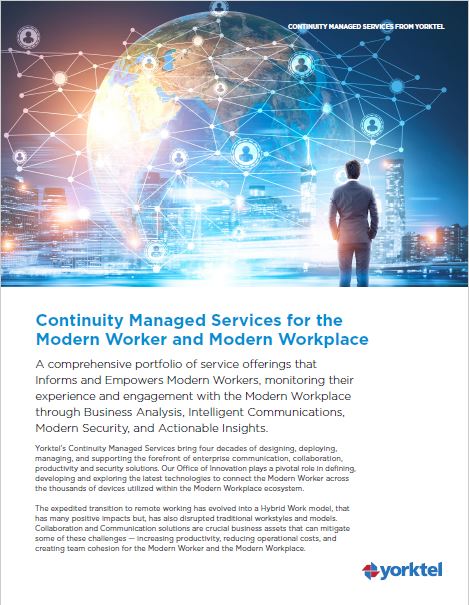In the age of the cloud, software as a service (SaaS), and distributed workforces, managing your organization’s technology ecosystem can consume a lot of your resources — namely time, finances, and focus. Especially if you run a hybrid cloud (including public, private or on-premises technology) or multi-cloud environment. IT teams that manage their organization’s applications and data across multiple clouds and platforms can spend a lot of their time “fighting fires” by acting reactively to security vulnerabilities, user onboarding requests and solving other core technology challenges. It can keep them from delivering on strategic digital transformation projects like business process automation and optimization.
The Difference Between a Managed Services Provider and Cloud Service Provider
A managed services provider (MSP) can help your business to optimize your application and data security, availability, and scalability, whether they are hosted in your data center, by a cloud service provider (CSP), or a combination of the two. Yet that often begs the question — what is a managed services provider, and how does it compare to a cloud service provider?
In this blog post, we’ll outline the difference between a managed services provider and cloud service provider, and highlight how a managed services provider can help your organization get the most from the cloud service providers you are working with now, and in the future.
What is a Managed Services Provider?
A managed services provider is a company that takes on the responsibility of monitoring, maintaining, and remediating on-premise and cloud-based technology on behalf of their contracted clients. They manage client-owned or contracted hardware, software, and cloud services. They generally have a a central location from where their employees remotely carry out tasks like:
- Application, database, and infrastructure upgrades, deployments, integrations and configurations
- Network performance management
- Monitoring of hardware and virtual servers
- Data backups and restores
- Managing your day-to-day end-user IT support helpdesk
- Event log management, reporting and analysis
Some MSPs specialize in managing an organization’s security perimeter, and technologies like anti-virus, anti-malware, intrusion prevention systems, and next-generation firewalls and security incident and event management systems (SIEMs). These companies are known as Managed Security Service Providers (MSSPs) and they generally focus on closely observing and managing security infrastructure and services. Once alerted and informed about the nature of security breaches or vulnerabilities, MSSP technicians can remediate them.
MSPs in the Hybrid Workplace Era
Managed service providers are especially effective for organizations with hybrid or distributed workforces that work in company offices, customer locations, and home offices, as is increasingly common post-pandemic. They can manage and support corporate systems, networks, and endpoint devices while supporting identity and access management through systems like Active Directory, and Microsoft 365.
Leading MSPs like Yorktel have unparalleled access to tools, certified expertise, and resources that can help them effectively manage cloud and on-premise technology for a multitude of businesses and institutions.
Communication and collaboration between remote and office-based employees, wherever they work, is especially important. So contracting with an MSP that specializes in managed service solutions for messaging, voice, and video calls and conferences like Microsoft Teams and Cisco Webex can be especially beneficial.
Aside from keeping your technology running optimally, MSPs and MSSPs can help your organization to meet its compliance reporting requirements, and highlight any anomalies or issues which may otherwise go undetected. These reports are especially critical for regulated healthcare providers, financial services institutions, and retailers, yet important for all businesses.

Continuity Managed Services for the Modern Worker and Modern Workplace
Yorktel’s Continuity Managed Services bring four decades of designing, deploying, managing, and supporting the forefront of enterprise communication, collaboration, productivity and security solutions.
What is a Cloud Service Provider?
A cloud service provider (CSP) delivers contract-based access to their computing resources and platforms for defined usage-based fees. Microsoft Azure, Amazon Web Services (AWS) and Google Cloud Platform are a few of the leading CSPs. They provide hosting for different web, data, and application hosting environments, including development, test, and production platforms. Many organizations subscribe to services from multiple CSPs, and continue to manage some applications and data in their own data centers.
Not all cloud services are created equal. Each platform has strengths and opportunities which align with certain business priorities. Most developers, architects, and other technology experts have their own cloud platform preferences, which can lead to multi-cloud environments including the top three CSPs mentioned above, and others.
How do MSPs add Value to CSP Services?
A managed services provider which can orchestrate the performance, security and interoperability of hybrid clouds, multi-cloud deployments and the devices which access them is a critical ally to any modern workplace. From evaluation and design to building, integrating and running complex cloud environments, an MSP like Yorktel can help your company to succeed in digitally transforming your business processes, and managing them far into the future.
If you’re ready to have a discussion about how a managed service provider could help your organization, you can reach out to us here and speak with one of our experts today!
